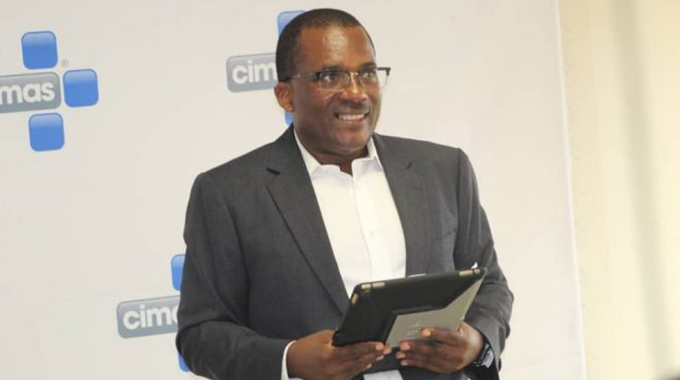Cimas’ Vuli: A leader with heart

Tawanda Musarurwa
I was interviewing him, but as it turned out I remember answering the first question: something about how Zimbabwe’s print media landscape is being grossly affected by digital media.
It wasn’t surprising really, because Cimas chief executive Vulindlela Ndlovu is ‘a man of the world’, so to speak.
“I joined Cimas (in 2015) after a career in various roles, but the accounting profession is where I spent the bulk of my years. In terms of sectors, I also worked in publishing, and I also had a stint in retail, then banking, and also private equity, so I have had the fortune of working in various sectors,” he said.
“Health was a new one for me, but of all the sectors, I would say it was the most fulfilling.”
Broadmindedness is a distinct business advantage.
“I think the previous roles are really an exposure into commerce and the various fields and trying to deliver certain services, particularly the consulting services. In a role such as this (CEO) you are sort of a consultant, and a coach, and a mentor for the team that you work with.”
A Chartered Accountant, with a Bachelor of Accountancy degree from the University of Zimbabwe, Vuli is a former managing director of BancABC and of Lufuno Capital Partners, where he worked on private equity and consulting assignments in Africa and worked with Small Enterprise Assistance Funds (SEAF) in promoting the SEAF Global Vintage Flexible Fund.
He is a former partner at KPMG Zimbabwe, where he started the KPMG Corporate Finance practice in 1997. He says he can’t pick out one or two people that have impacted his career development, but attributes it to past experiences, particularly in respect of on-the-job learning.
“I was lucky, the organisations that I worked for had good mentors and also the networks that I have built over the years.”
Notwithstanding the above, on the global landscape Vuli looks up to British business magnate, investor, author and philanthropist Richard Branson, the founder of Virgin Group, “because of his daring attitude and the things that he has achieved. And also because he has engaged in a lot of sectors, and is passionate about service.”
“Richard is also tuned into issues about Africa, and that speaks to me. I have worked in Africa all my life and my life-desire is to restore the dignity of African people,” said Vuli.
What does he think of his five years at the helm of one of Zimbabwe’s largest health service providers?
“I must say I have just started my fifth year in this role and the last four years have been littered with an array of challenges, but they have nonetheless been enjoyable. You know what, while as an organisation we have done our best to meet the health needs of our customers, I would have wanted to deliver more.
“The feedback from our customers suggest that there are a lot of gaps that we are yet to cover, so certainly I can point to a lot of things I would have wanted to execute better. But as an organisation I’m glad that we have set a purpose to aspire for healthier communities.
“I believe there is a lot of room to improve our customer’s experiences. I am encouraged through, as we have an increasingly young and very talented team. I believe that ultimately we should deliver on our promises,” said the Cimas boss.
With five years as CEO of a 70-year old institution under his belt already, you would think Vuli has seen just about anything. But there are things that still keep him awake at night.
“I’d say attracting and retaining top talent, that’s top of my agenda. And that is followed by attaining and sustaining a high performance culture. As an organisation we are undergoing a transformation and any transformation needs top talent and high performance culture, so those are the things I am constantly exercising my mind about.
“The lack of economic stability in the country is also of deep concern as we continuously have to respond to extremely adverse emerging trends, and sometimes this means a business model that is changing at an unhealthy pace.
“The other thing that is a problem in terms of our sector is the fact that the public health sector is the primary source of healthcare services in the country, and we cannot function if this sector is not functioning, so that presents a whole lot of problems. Like right now, with this coronavirus, how responsive would we be if we were victims of that?”
On various fora Vuli has lamented the general lack of integration within Zimbabwe’s health services sector.
It’s a message he almost never fails to put across.
“In terms of shortfalls, that emanates from the lack of a common tariff. So service providers and medical insurers in Zimbabwe have consistently failed to reach consensus on how much their services are worth, and as a result our customers face these perpetual shortfalls. It has been worse in the last year where you find a serious mismatch between medical inflation and consumer inflation.
“The costs of medicines and medical services are way ahead of inflation as they tend to track currency depreciation, so increases in medical aid subscriptions are not adequate to counter inflation as contributions are tied to salaries, and in the majority of cases, salaries are not tracking inflation.”
“We want to make sure that we retain the ability to offer customers products and services that suits their needs, hence our integrated health model that provides health financing as well as health services; it has served us well and we intend to deepen it.”
In view of the inflationary pressures and currency depreciation affecting both businesses and customers, many medical aid subscribers have been questioning whether it is still worth it to be paying their medical aid subscriptions.
How has Cimas coped with this adversity on its core business?
“Our intervention earlier this year was actually to mitigate that where we launched products, some of which are priced fairly competitively, and yet they offer value.”
Besides offering medical aid, Cimas operates a laboratory, clinics, drug facilities, ambulance services, dental facilities and optical facilities. The medical institution clearly wants to be a partner through a customer’s health journey. But what if — due to circumstances out of their control — they cannot?
“I’m aware of the lobby to actually exclude us from service provision. One needs to look at the history of how we ended up in service provision. For Cimas, the first foray into service provision was when we bought medical laboratories; the industry invited us to do that, and that was because the former owners, that is, the pathologists were emigrating and this was shortly after independence, and no one had the capacity to do it and we did it. And we have run that laboratory successfully ever since, and it was the first laboratory to be ISO accredited.
“Then followed by that we then went into dialysis services in 1999. Why? It was to complement the public sector. Dialysis is a very finicky area, where if one misses the dialysis or if the quality is compromised, someone’s life could be in danger, so in the public sector they were starting to see some problems and we thought it best to complement them. We have members who have been dialysing since then.
“We then went into primary healthcare. At the height of hyperinflation our members had no access to services, so we embarked on the path to open primary healthcare clinics and they have grown now to 12, and we will be opening a 13th one soon in Victoria Falls. These clinics even came in handy last year, when access proved to be difficult.
“So for me, if I look at that role and then we say let’s stop medical aid providers from providing services, for what? We are told it’s because of conflict of interest. Conflict of interest arising from what? Even right, the law does not allow us to say to a member go to that particular facility. And the new medical regulatory bill, I assume will, have these same provisions,” said Vuli.
Despite running one of Zimbabwe’s largest medical aid societies, he has broader vision for the country’s health sector; I think he meant it when he said he found his greatest fulfilment in his current role in the health sector.
“We want to inspire healthier communities by providing those global standard health and welfare solutions, and really making sure that wellness becomes a part of life, and that people are truly on the path to living longer, healthier lives.
“By the way people will live longer, the technology is there, but it’s the quality of life you will live at 90 that we are really talking about.”










Comments